- Home
- Will McIntosh
Faller Page 7
Faller Read online
Page 7
“Get Dad,” the boy said. They ran off.
Faller ran his hand over gritty plaster. He was on another world. It was too much to wrap his exhausted mind around, so he lay there waiting for the children to fetch their dad, thinking of nothing.
Eventually he heard the children approach again, chattering excitedly. An adult male voice shushed them.
“What are you doing hiding in there? Come on out.”
Faller was too exhausted to move. “Water,” he said. He pursed his lips to add please, but it was too much effort.
The parachute slid across his face with a soft zipping sound until it came completely off and he was squinting into an overcast sky. A man’s scowling face, thick-bearded and weather-beaten, appeared over him, appraising him like a stinking dead fish.
“I’ve never seen you before. Which borough are you from?”
Another voice cut in, from a distance. “Who is it?”
“I’ve never seen him before,” the scowling man said over his shoulder.
“He fell out of the sky,” one of the children offered, a red-haired girl with a big bald spot above one temple. Three adults pushed in close to stand over Faller. Their faces were gaunt, their eyes too deep in the sockets, their cheeks hollow.
“He’s definitely not from this borough,” a man with no front teeth said, before turning to spit on the ground.
The ground felt unsteady under him, as if he, these people, and the ground itself were still falling. It was hard to grasp that he was going to live. If he could get some goddamned water he was going to live.
“What do you think happened to him?” a bucktoothed woman asked. She was wearing two strands of brown-stained pearls around her wrist. She raised her voice. “What happened to you? Who are you?”
“I—I fell.” When no one seemed to understand, Faller pointed at the sky.
The people looked at each other, frowning.
“We saw him fall,” the other child, a boy, insisted.
“He’s from another borough. Uptown would be my guess,” Dad said, ignoring the kids. He turned away. “I’ll be right back.”
“Water?” Faller croaked. No one moved.
The kids’ dad returned carrying a dirty half-brick. “Simplest thing to do is bash in his skull and drag him to a sewer.”
“No!” Faller said, lifting his hands.
Dad pointed. “You kids go on home. You’re too young to see this sort of thing.”
“Hold on, Bo. Maybe we should take him to Moonlark’s people,” a balding man with a grey beard hovering near the edge of the little circle said. “If he’s from Uptown he might know useful things.”
“Moonlark,” Faller agreed, his heart hammering.
“Christ, it’ll be two hours getting there and back,” Bo said, ignoring Faller.
“And you’re saying, what, that’s not worth getting in good with Moonlark? We’re bringing him a spy—he’ll remember that.”
“I’m not a spy,” Faller managed.
“Yeah.” The bald man laughed. “You fell out of the sky.” He bent and pulled Faller into a sitting position. “Come on, fella.”
They spoke strangely. Accent was the word that popped into Faller’s mind. The man tried to pull Faller to his feet, but Faller’s knees refused to lock.
“Stand up,” Bo said, shaking him, which caused Faller to collapse into the guy’s arms. “Christ. Help me with him, will you?”
The balding guy took one of Faller’s arms. They pulled the parachute harness off him and tossed it aside, then let Faller sag and dragged him.
“Dad, what about this?” one of the kids called.
They paused in their dragging. The boy was holding one handle of a red wheelbarrow leaned up against the low wall. “That’s not a bad idea. Bring it over.”
Faller was loaded into the wheelbarrow like a sack of flour, his head propped against the base of one of the handles because he didn’t have the strength to hold it up.
IV
“HEY, IT’S the boy wonder,” Izabella said brightly, her words garbled. She was sitting up in bed, her hands lying palms up in her lap, her fingers alternately curling into fists and hyperflexing open.
What was it, eight days since her diagnosis? The prion worked so fast. Soon her whole body would be doing that. The prion was gradually disconnecting Izabella from her nervous system; in another month it would be completely outside her control.
Tears came to Peter’s eyes, but he went on smiling. “Hi, Red Sonja. How are you feeling?”
“Like shit, if you really want to know. Like a big old sack of shit.”
Peter laughed. “I’m sorry. It’s not funny. I’m just laughing at how you put it.”
“Go ahead, laugh at the invalid, you sick bastard.” Izabella held out her hand; it took Peter a moment to realize she wanted him to take it.
“It’s interesting, how much dying changes you.” It was an effort for her to form the words. “I was never one of those touchy-huggy people. I didn’t like to be touched. Now, I can’t get enough.”
Peter gave her hand a squeeze. “Maybe it’s because everything else falls away, except for the people in your life.” Under the sheets, her toes were curling and uncurling. He couldn’t bear the thought of what she was facing a week from now, a month.
“You see, that’s why I look forward to your visits. Anyone else would have said, ‘You’re not dying, don’t talk like that.’ Not you, though.” Her hand squeezed and released, squeezed and released, like a heartbeat. “Even Melissa does that. She was here most of the afternoon. It’s like they’re embarrassed by me talking about something I can’t help but think about every minute.”
“They don’t want to think about life without you in it. Plus, talking about death terrifies people.”
“Doesn’t it terrify you?” she asked.
“Hell, yes,” Peter said. “I’ve just never been good at suppressing my fears. Or anything else, for that matter.”
Izabella laughed, and to Peter, it felt like a small victory. All he had to offer, besides a hand to hold, was to make some of these moments more bearable.
“I see it’s not enough to take my Nobel. You want my wife, too,” Ugo said behind him.
Peter hadn’t heard him come in. He opened his fingers to let go of Izabella’s hand, but Izabella only drew his hand closer. She raised her other hand, held it out until Ugo grasped it. He let out a sigh like a deflating cushion as he sat on the opposite side of the bed from Peter.
“What would you do with a Nobel for physics?” Peter strained to keep his tone playful. “You need to talk to the people who give them out for medicine and physiology.”
“You’re saying I didn’t make a significant contribution toward the work?”
“No. Of course I’m not.” Peter licked his lips; his mouth had gone dry. They’d been dancing around this conversation for two weeks, the tension in the lab growing tighter by the day. “I’m not on the committee, Ugo. I would have been honored to share the award with you, but I don’t get a say.”
Ugo stuck out his bottom lip, considered. “Then you’re saying I did make a significant enough contribution to merit inclusion, and the committee made a mistake?”
That’s not what he’d said. Ugo was trying to back him into a corner.
“Guys? I’m dying here. Can we drop the shop talk?” Izabella said.
“Sorry.” Ugo reached out and brushed Izabella’s hair.
She closed her eyes. “And please, don’t talk about the goddamned war.”
“All right.” Ugo leaned over and gave her a kiss on the cheek. “How are you feeling?”
“As I was telling Peter, I feel like shit.” She gave Ugo an unreadable look, then turned to look at Peter, started to say something, then stopped.
“What is it?” Peter asked, speaking softly.
“I was wondering how the work on the duplicator was going.”
“Didn’t you just chastise us for talking shop?” Ugo asked.
&nb
sp; “I was chastising you for arguing, but I was trying to be polite about it.” Her jaw quivered violently, then her throat contracted in a sharp spasm. She was swallowing, Peter realized—all of that effort just to swallow. “How is the work coming?”
Peter shrugged. “Fine.”
“You said the mice came through just fine.”
“That’s right.”
A goldfinch landed on the bird feeder Ugo had hung outside her window. Izabella watched it peck seeds from the feeder. “They came out remembering exactly the same things?”
“The duplicates run mazes the originals memorized, so it sure looks that way. It’d be surprising if they didn’t, given that they’re the same down to the cellular level.”
“Explain to me how it works again? I know you’ve explained it before.”
Peter gave her a quizzical look, not sure why she’d suddenly taken such an interest in his work. Maybe she was just trying to steer the conversation onto safe ground, away from the argument he and Ugo had been having.
“The duplicate is an echo of the original. The original travels a millisecond back in time through a miniwormhole.”
Izabella nodded, the nod jerky, tremulous.
Ugo cleared his throat. “Bella, I have a…”
“I want you to duplicate me,” Bella said.
“… surprise,” Ugo finished. He sputtered. “I’m sorry, what did you just say?”
“The duplicate wouldn’t have Peterson-Jantz, right?” Izabella said.
Her words had caught Peter completely off guard. He thought Izabella must be joking, but there was no mischievous glint in her eyes; she seemed completely earnest as she looked from Ugo to Peter.
“It wouldn’t, right?”
“Right,” Peter said, “it wouldn’t. A prion is a foreign body.” He squeezed her hand. “But Bella, you’d still have it.”
“I understand that. But short of being cured, the most comforting thing I can imagine is knowing everything I’ve been, my body, all of my memories, will carry on. That in some sense I’ll still live out my life with Ugo.”
The thought of actually dropping Izabella through that aperture made Peter shudder.
“You’re joking, aren’t you?” Ugo asked.
Izabella’s hands went on squeezing and releasing, squeezing and releasing. “If you were lying here, you wouldn’t need to ask that question.”
Ugo grasped the bed rail, leaned close to her. “Bella, I love you. I don’t want a replacement, I want you. I’m going to get my virus to isolate the prions without damaging memory.”
“There isn’t time,” Izabella almost shouted. More quietly, she added, “We all know that. Stop bullshitting me.”
A nurse breezed in, took in the tense, silent faces and stopped short. “I’ll come back later.”
When she was gone, Ugo said, “Izabella, we can’t possibly do what you’re asking. It’s unthinkable. You understand that, don’t you?”
“It may be unthinkable for you. For me it feels like my last chance.”
Ugo shushed her gently. “Don’t talk like that. I’m going to figure this out. We’re going to live a long life together.”
Izabella didn’t look convinced.
“I’ve been trying to tell you,” Ugo said, changing the subject. “I have a surprise for you.”
Izabella raised her eyebrows, her smile stiff, quivering.
“I know how disappointed you were that you couldn’t make it to see the Brentano String Quartet perform. So…”
Ugo disappeared into the hall.
He returned followed by a woman carrying a cello, then a silver-haired man with a violin. The viola and second violin followed.
Izabella laughed with delight, sounding more energetic than she had since she was diagnosed. “Oh, my God. You’re kidding me.”
When their seats were in place, the quartet began. In the small room, the music was exquisite; absolutely, perfectly glorious.
Peter listened to the first piece with tears in his eyes, then excused himself so Ugo and Izabella could enjoy some time alone together.
Izabella’s request had rattled him. They’d talked in theory about duplicating a human being, but the idea of a flesh-and-blood Izabella sitting at her own deathbed, holding her own hand, was something out of a horror movie.
On the way home, Peter got caught in a traffic jam on Richmond Road. It took him forty minutes to get past the choke point, which turned out, not surprisingly, to be a gas station. He only had a quarter of a tank left himself, but he couldn’t afford to spend three hours waiting in line. Not with a new bioengineered plague breaking out in Japan.
13
IF HE hadn’t been so close to death, it would have been humiliating to be pushed rattling and bumping through the broken streets while people stared. The men took turns pushing, the bucktoothed woman holding Faller’s shoulder to keep him from falling out.
If anything, the people they passed looked even thinner and hungrier than on Faller’s world. The streets weren’t as straight and evenly spaced; they wound and meandered, intersecting other streets haphazardly. Otherwise he could have been on his world. The familiar scent of urine and shit came and went depending on the breeze. The four- and five-story buildings were tightly packed. Even the junk was the same—cars, trucks, and buses, rusting along the roads. There were red fire hydrants, brown telephone poles—all the things everyone could name but no one had any use for.
They veered to the right as they approached a long, high wall that stretched on and on. It was constructed of junk—cars, desks, cinder blocks—fit together like a huge puzzle. As Faller took it in, wondering what its purpose was, it started to drizzle. The cool, wet drops tingled wonderfully on Faller’s face and arms.
“Shit,” Bo said, picking up his pace as Faller opened his mouth to catch the silver droplets. “I knew this was a bad idea.”
Turning right again, they’d gone a few blocks when suddenly the landscape opened onto a stunning vista. To Faller’s left a white tower rose from a weedy field. It was tall and thin, tapering to a triangular point. To their right, beyond a green rectangular pond, a magnificent domed building sat above a long flight of marble steps. It was embellished with hundreds of columns, the whole thing white like the tower. His wheelers barely looked up as they turned toward the tower, then veered right before reaching it. They bumped along a walkway that edged another weed-choked field, then took a road that led toward another huge white building, this one with columns around the entrance.
They tipped the wheelbarrow at the foot of a long half-moon staircase leading up to the front doors, then dragged Faller up, his heels thumping painfully on each step. A man in a suit waited on the landing at the top, arms folded, watching their progress. The man had dark hair, and acne scars on his cheeks above his beard that made him look angry. He wasn’t nearly as thin as the others.
The men set Faller down and a brief, muffled conversation ensued. Finally the acne-scarred man gestured toward the door with his head, his arms still folded.
Bo and the bald man picked Faller up and carried him inside, through a stunning vestibule. Faller marveled at an immaculately clean chandelier, ornately carved molding skirting a high ceiling, as they continued through to a long hallway.
Faller looked at Bo’s face and was surprised at the wide-eyed fear so apparent there. Sensing Faller’s attention Bo looked down at Faller, scowled, and tried unsuccessfully to appear less terrified.
They carried Faller into a big, wood-paneled room where a man was working at a desk, and set him on the floor beside a burgundy and black sofa with curled wood legs.
The man behind the desk rolled his chair out from behind it in one deft motion. Moonlark had a well-fed build, a big lion’s head, dark hair, and heavy-lidded eyes. He was wearing a black suit that looked like it had been pulled off a rack on Day One and never worn.
From his chair Moonlark looked Faller over, his eyes narrowing. He leaned in for a closer look, pushing his face close to
Faller’s, going as far as running his finger over Faller’s cracked, arid lips.
“How did you get like this?” Moonlark asked.
“Falling,” Faller croaked. He tried to lick his lips, but his dried tongue only stuck to them.
“Falling? What do you mean, falling?” Moonlark tugged his flight suit. “What’s this?”
“To fall,” Faller said, knowing he was making no sense, but too weak to elaborate. “Please, some water?” His tone sounded pitiful and cloying even to him.
Moonlark turned to the acne-scarred man, who was standing in the doorway. “Get him some water.” The man all but ran.
Turning to the men who’d brought Faller, Moonlark asked, “Why did you bring him to me?”
“He’s a spy,” Bo said immediately. “We found him on the roof of our apartment building, hiding under a big sheet.”
“A sheet?” Moonlark sounded like he was losing his patience.
“A parachute,” Faller said. “I fell.”
“From what?” Moonlark pressed. “You keep saying you fell. You fell from what?”
“From the sky.”
Moonlark squinted at Faller, his lips curled in confusion, or disgust. He looked up at the other men. “Put him on the couch.” The two men who’d recently dragged Faller across a yard lifted him like he was an egg and set him on the couch, repeatedly glancing at Moonlark to gauge whether their lifting met with his approval.
“You’ve never seen him before?” Moonlark asked them.
Bo shook his head. “Never. But he can’t be telling the truth…” His words trailed off, part statement, part question.
Moonlark glanced at Faller. “I appreciate you men bringing him to me. Your thoughtfulness won’t be forgotten.”
Picking up on the dismissal, the two men backed out of the room. The acne-scarred man squeezed past them carrying a glass pitcher. Faller reached for it when it was still halfway across the room. Pain shot down his arms and back, and he nearly fell off the couch straining to get to it. The man set the pitcher in Faller’s hands; they shook so violently he sloshed water down the front of his shirt and he got more air than water. He sputtered, frustrated.

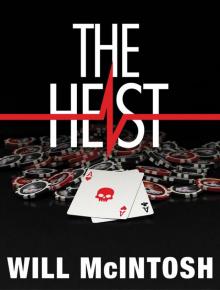 The Heist
The Heist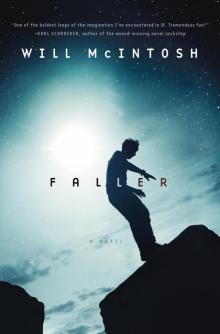 Faller
Faller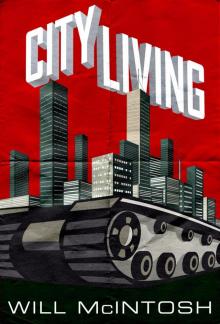 City Living
City Living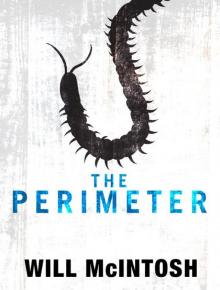 The Perimeter
The Perimeter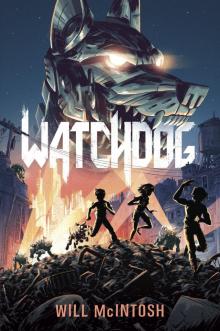 Watchdog
Watchdog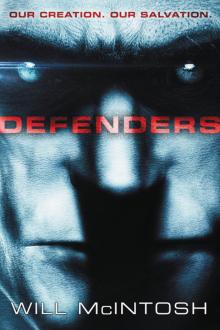 Defenders
Defenders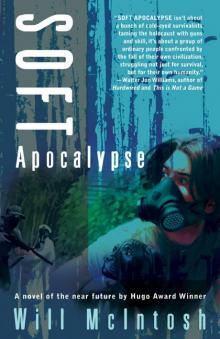 Soft Apocalypse
Soft Apocalypse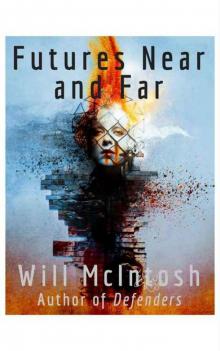 Futures Near and Far
Futures Near and Far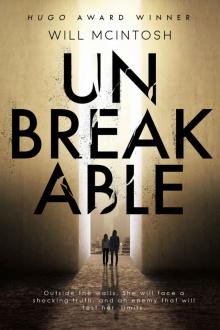 Unbreakable
Unbreakable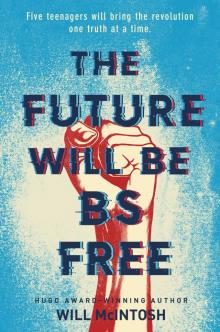 The Future Will Be BS Free
The Future Will Be BS Free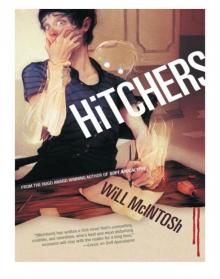 Hitchers
Hitchers Burning Midnight
Burning Midnight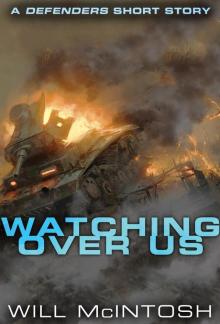 Watching Over Us
Watching Over Us